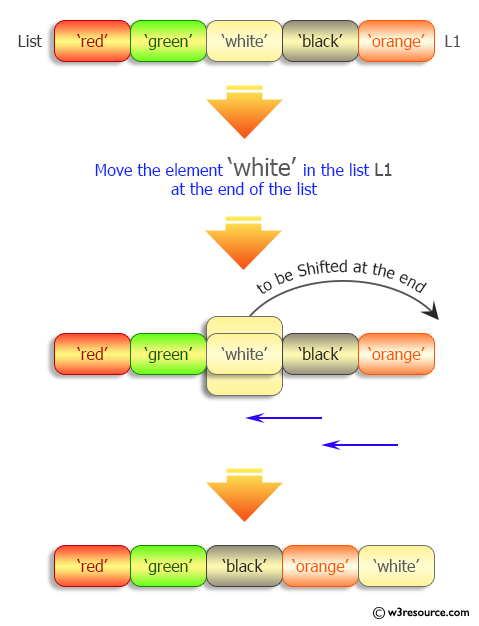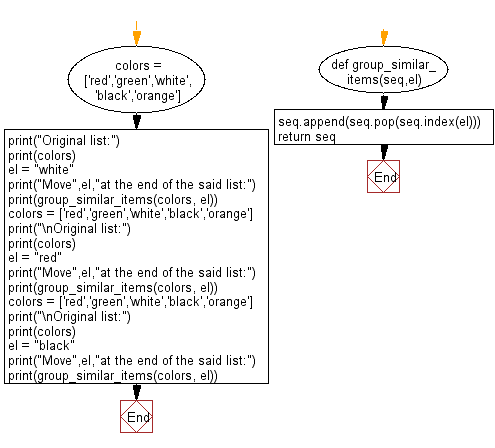Python: Move a specified element in a given list
Move Element to End of List
Write a Python program to move a specified element in a given list.
Visual Presentation:

Sample Solution:
Python Code:
# Define a function 'group_similar_items' that moves a specified element to the end of a list.
def group_similar_items(seq, el):
# Remove the specified element 'el' from the list and append it to the end.
seq.append(seq.pop(seq.index(el)))
return seq # Return the modified list.
# Create a list 'colors' containing string elements.
colors = ['red', 'green', 'white', 'black', 'orange']
# Print a message indicating the original list of colors.
print("Original list:")
# Print the original 'colors' list.
print(colors)
# Specify the element 'el' to be moved to the end of the list.
el = "white"
# Print a message indicating the movement of 'el' to the end of the list.
print("Move", el, "at the end of the said list:")
# Call the 'group_similar_items' function with 'colors' and 'el', then print the result.
print(group_similar_items(colors, el))
# Revert to the original 'colors' list.
colors = ['red', 'green', 'white', 'black', 'orange']
# Print a message indicating the original list of colors.
print("\nOriginal list:")
# Print the original 'colors' list.
print(colors)
# Specify the element 'el' to be moved to the end of the list.
el = "red"
# Print a message indicating the movement of 'el' to the end of the list.
print("Move", el, "at the end of the said list:")
# Call the 'group_similar_items' function with 'colors' and 'el', then print the result.
print(group_similar_items(colors, el))
# Revert to the original 'colors' list.
colors = ['red', 'green', 'white', 'black', 'orange']
# Print a message indicating the original list of colors.
print("\nOriginal list:")
# Print the original 'colors' list.
print(colors)
# Specify the element 'el' to be moved to the end of the list.
el = "black"
# Print a message indicating the movement of 'el' to the end of the list.
print("Move", el, "at the end of the said list:")
# Call the 'group_similar_items' function with 'colors' and 'el', then print the result.
print(group_similar_items(colors, el))
Sample Output:
Original list: ['red', 'green', 'white', 'black', 'orange'] Move white at the end of the said list: ['red', 'green', 'black', 'orange', 'white'] Original list: ['red', 'green', 'white', 'black', 'orange'] Move red at the end of the said list: ['green', 'white', 'black', 'orange', 'red'] Original list: ['red', 'green', 'white', 'black', 'orange'] Move black at the end of the said list: ['red', 'green', 'white', 'orange', 'black']
Flowchart:

For more Practice: Solve these Related Problems:
- Write a Python program to move all occurrences of a specified element to the end of a list while keeping the order of other elements intact.
- Write a Python program to move a specified element to the end of a list and then sort the remaining elements.
- Write a Python program to move a specified element to the end of a list and perform a cyclic rotation by one position.
- Write a Python program to move a specified element to the end of a list only if it appears more than once.
Go to:
Previous: Write a Python program to sum two or more lists, the lengths of the lists may be different.
Next: Write a Python program to compute the average of nth elements in a given list of lists with different lengths.
Python Code Editor:
What is the difficulty level of this exercise?
Test your Programming skills with w3resource's quiz.
